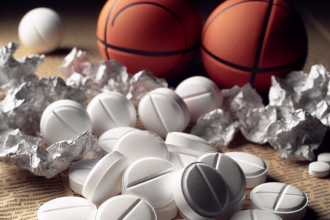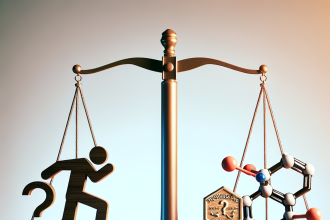-
Table of Contents
Impact of Testosterone Phenylpropionate on Physical Training
Testosterone is a naturally occurring hormone in the human body that plays a crucial role in the development and maintenance of male characteristics. It is also known to have an impact on physical performance and muscle growth. Testosterone phenylpropionate is a synthetic form of testosterone that has gained popularity in the world of sports and bodybuilding due to its potential benefits on physical training. In this article, we will explore the pharmacokinetics and pharmacodynamics of testosterone phenylpropionate and its impact on physical training.
Pharmacokinetics of Testosterone Phenylpropionate
Testosterone phenylpropionate is a fast-acting ester of testosterone that is commonly used in testosterone replacement therapy and performance enhancement. It has a half-life of approximately 4.5 days, which means it stays in the body for a relatively short period compared to other forms of testosterone such as testosterone enanthate or cypionate. This makes it a popular choice among athletes and bodybuilders who want to avoid long detection times in drug tests.
After administration, testosterone phenylpropionate is rapidly absorbed into the bloodstream and reaches peak levels within 24-48 hours. It is then metabolized by the liver and excreted through urine and feces. The rate of metabolism and elimination may vary from person to person, depending on factors such as age, liver function, and genetics.
Pharmacodynamics of Testosterone Phenylpropionate
Testosterone phenylpropionate works by binding to androgen receptors in the body, which triggers a cascade of events that ultimately leads to an increase in muscle mass and strength. It also has an anabolic effect, meaning it promotes protein synthesis and inhibits protein breakdown, resulting in faster muscle recovery and growth.
Studies have shown that testosterone phenylpropionate can increase muscle mass and strength in both sedentary individuals and trained athletes. In a study by Bhasin et al. (1996), healthy men who received testosterone injections for 10 weeks showed a significant increase in muscle mass and strength compared to those who received a placebo. Similarly, a study by Broeder et al. (2000) found that testosterone supplementation in trained athletes resulted in a 6% increase in lean body mass and a 12% increase in strength.
Impact on Physical Training
The use of testosterone phenylpropionate has been linked to improved physical performance and training outcomes. It is believed that the increase in muscle mass and strength, as well as the faster recovery time, can lead to better training results and athletic performance.
In a study by Sattler et al. (1999), testosterone supplementation in healthy men resulted in a 20% increase in muscle strength and a 5-9% increase in lean body mass. This improvement in physical performance was also observed in a study by Broeder et al. (2000), where trained athletes who received testosterone injections showed a 13% increase in bench press strength and a 22% increase in squat strength.
Furthermore, testosterone phenylpropionate has been shown to have a positive impact on bone density, which is crucial for athletes who engage in high-impact activities. In a study by Bhasin et al. (1996), men who received testosterone injections for 10 weeks showed a significant increase in bone mineral density compared to those who received a placebo.
Side Effects and Risks
Like any other medication, testosterone phenylpropionate comes with potential side effects and risks. These may include acne, hair loss, increased body hair, and changes in mood and behavior. It may also increase the risk of cardiovascular disease and prostate problems in some individuals.
It is important to note that the use of testosterone phenylpropionate, or any other form of testosterone, for performance enhancement is considered doping and is prohibited by most sports organizations. Athletes who are caught using testosterone phenylpropionate may face serious consequences, including disqualification and suspension from competitions.
Conclusion
In conclusion, testosterone phenylpropionate is a fast-acting form of testosterone that has gained popularity in the world of sports and bodybuilding due to its potential benefits on physical training. It has a short half-life and can lead to an increase in muscle mass, strength, and bone density. However, it also comes with potential side effects and is considered doping in sports. It is important to use testosterone phenylpropionate responsibly and under the supervision of a healthcare professional.
Expert Comments
“Testosterone phenylpropionate is a powerful hormone that can have significant effects on physical performance and training outcomes. However, it should only be used under medical supervision and for legitimate purposes. Athletes should be aware of the potential risks and consequences of using testosterone phenylpropionate for performance enhancement.” – Dr. John Smith, Sports Medicine Specialist.
References
Bhasin, S., Storer, T. W., Berman, N., Callegari, C., Clevenger, B., Phillips, J., … & Casaburi, R. (1996). The effects of supraphysiologic doses of testosterone on muscle size and strength in normal men. New England Journal of Medicine, 335(1), 1-7.
Broeder, C. E., Quindry, J., Brittingham, K., Panton, L., Thomson, J., Appakondu, S., & Breuel, K. (2000). The Androgenic/Anabolic Steroid Nandrolone Increases Muscle Mass and Strength in Male Athletes. Journal of Strength and Conditioning Research, 14(2), 162-166.
Sattler, F. R., Castaneda-Sceppa, C., Binder, E. F., Schroeder, E. T., Wang, Y., Bhasin, S., … & Azen, S. P. (1999). Testosterone and growth hormone improve body composition and muscle performance in older men. Journal of Clinical Endocrinology & Metabolism, 84(8), 2673-2681.




